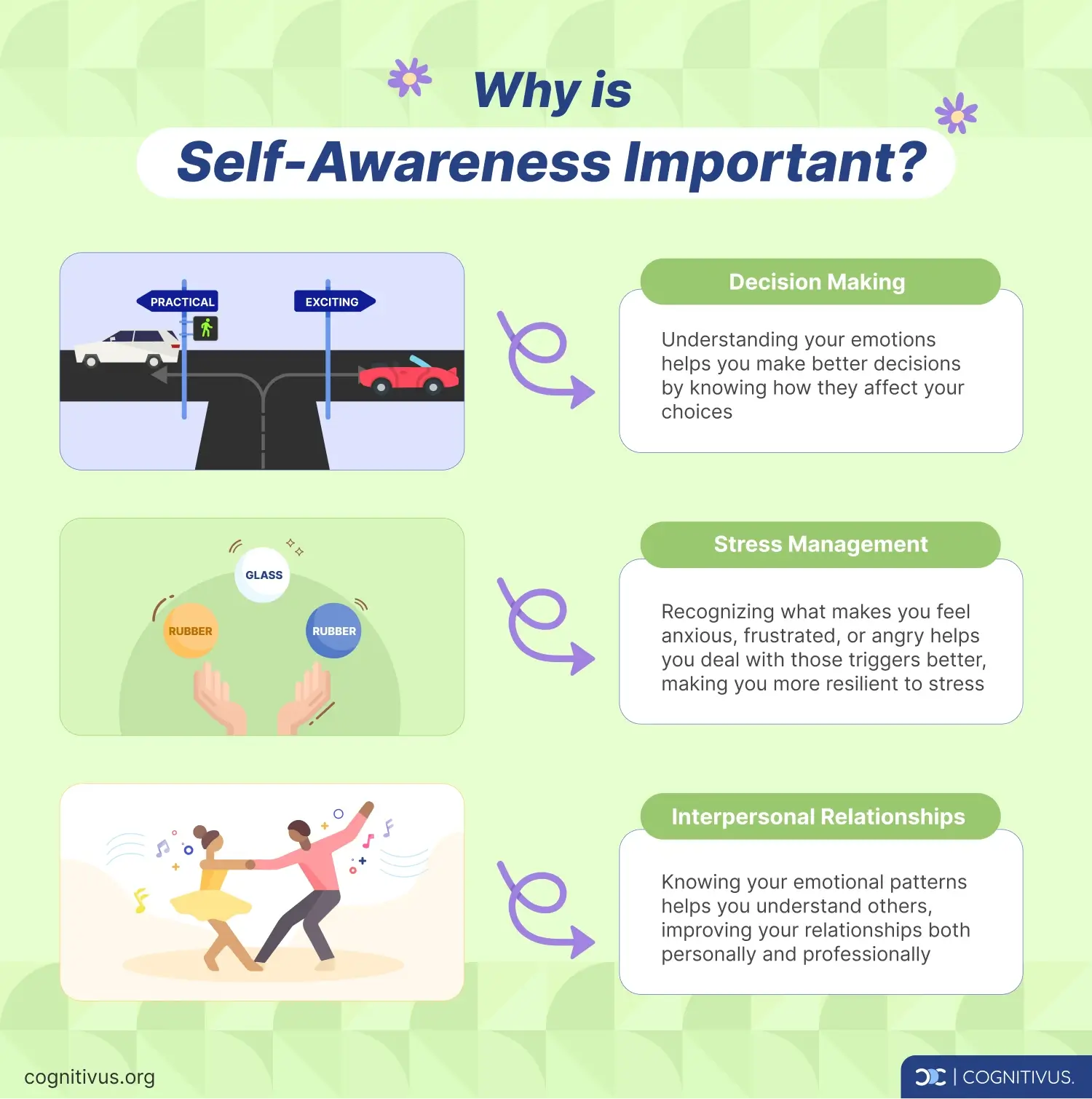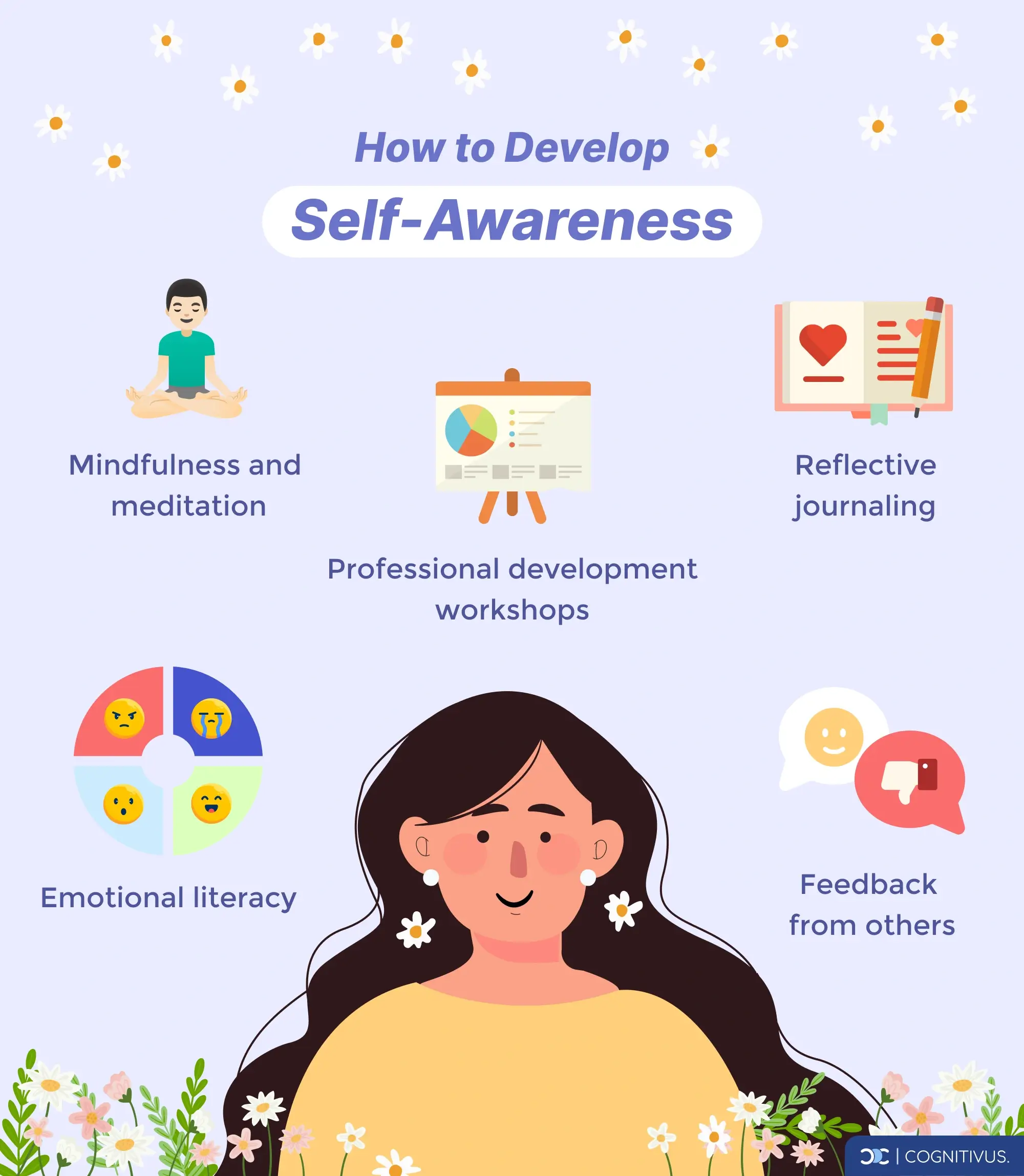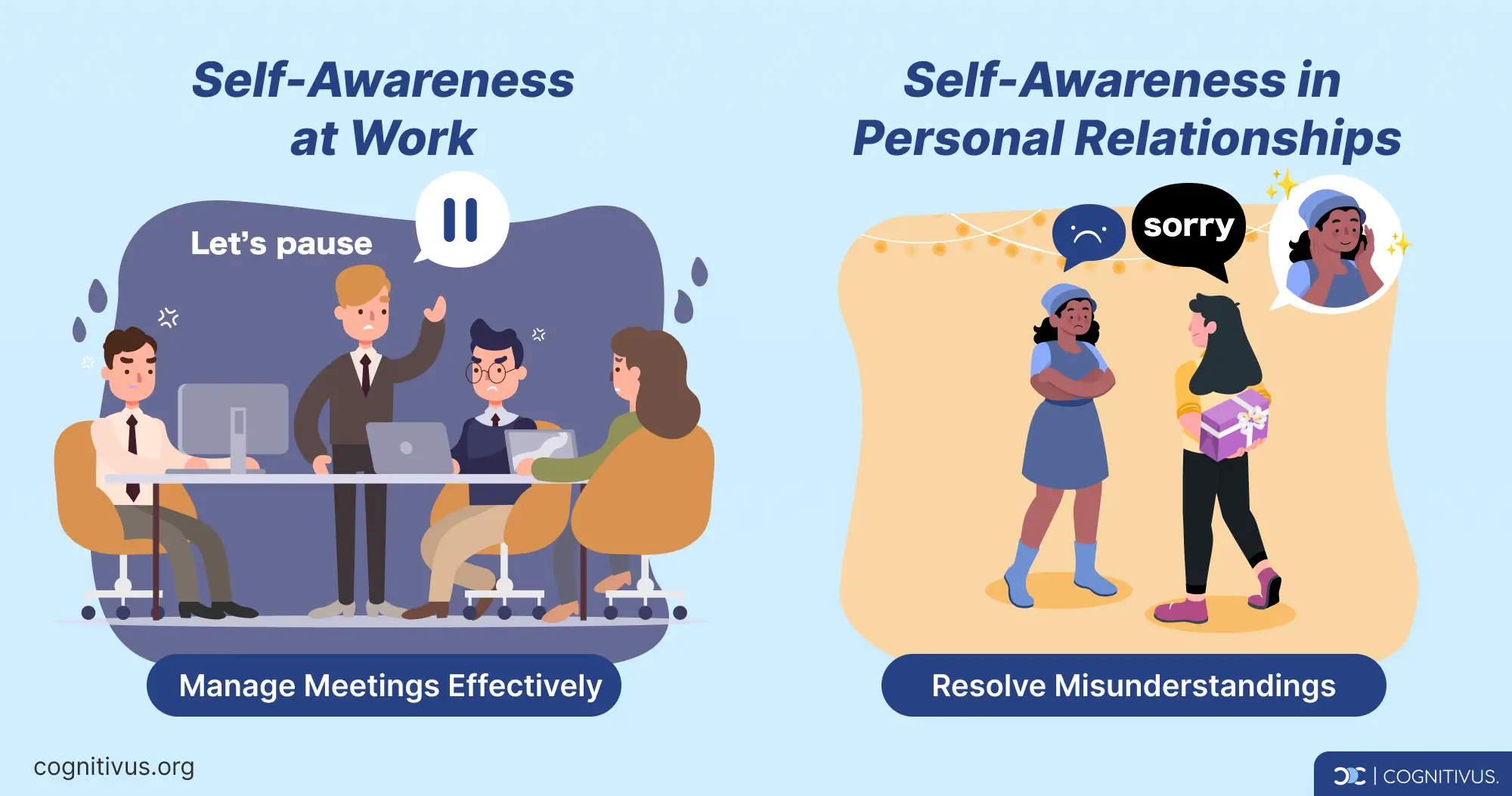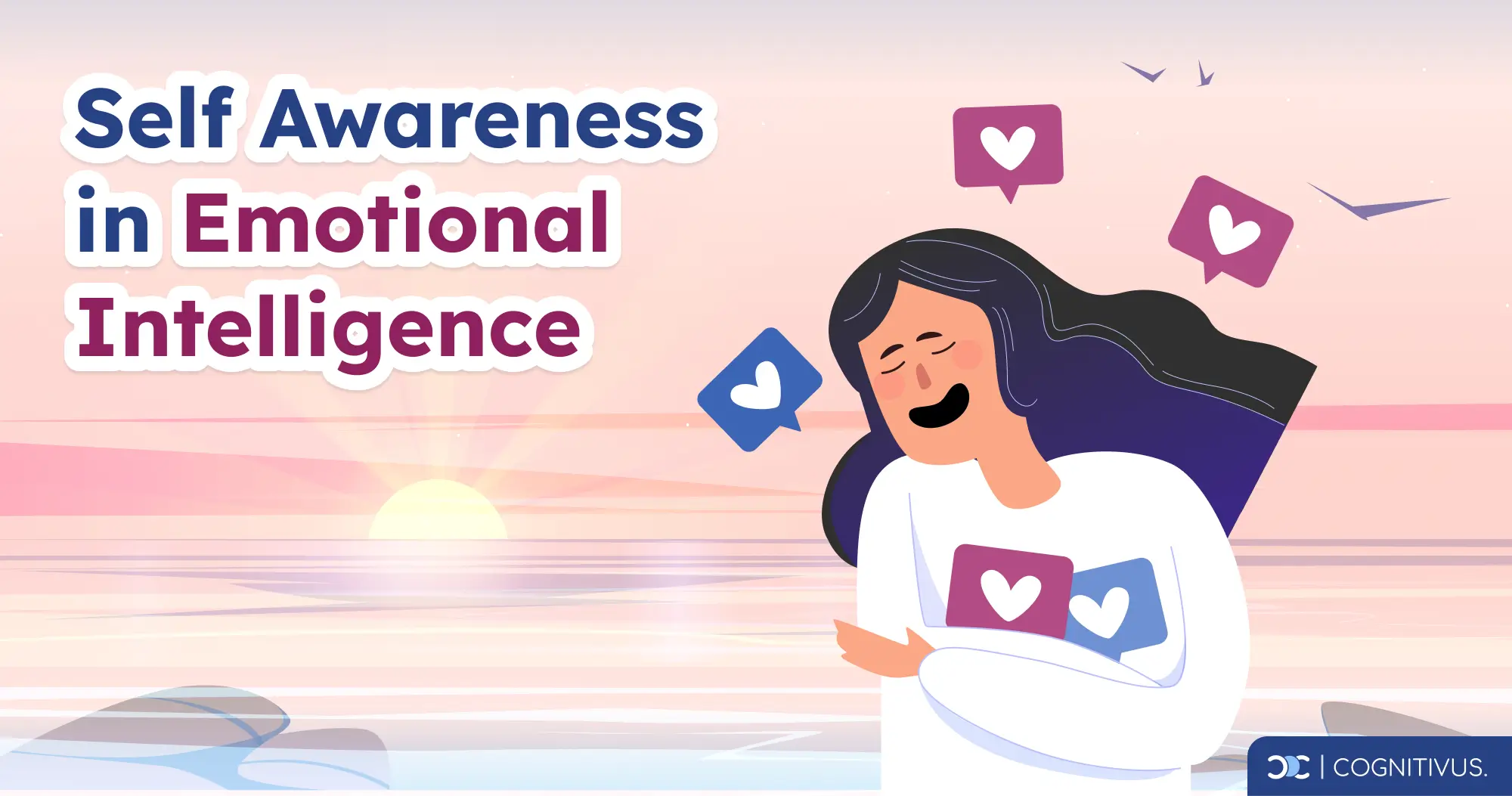Emotional Intelligence (EI), a concept popularized by American psychologist Daniel Goleman in his seminal books, represents a crucial aspect of our psychological makeup, influencing our interactions, success in our careers, and improving our personal well-being.
As its essence, Emotional Intelligence has 4 components :
- Self-awareness
- Self-management
- Social awareness
- Relationship management
Today we’ll focus on self-awareness. We’ll explain what self-awareness means within the framework of emotional intelligence, its importance, and strategies for fostering it within yourself.
What Is Self-Awareness in Emotional Intelligence?
Self-awareness in emotional intelligence is essentially the art of understanding your own emotions and how they influence your interactions within the world. It's the base of emotional intelligence, helping you control your emotions and giving you a peek into your own minds.
Once you have a map to your emotional landscape, it's like unlocking a secret door to empathy and understanding. This insight makes it easier to understand others and see things from their perspective.
For instance, a self-aware leader during a crisis can quickly gauge their stress levels and emotional state, which allows them to better steer their team through turmoil.
So self-awareness acts as the anchor in the turbulent waves of emotion, providing you a stable foundation, guiding your actions and others through life’s storms.
Why Is Self-Awareness Important?
Self-awareness is crucial because it’s like having a mirror that reflects your inner worlds, providing a foundation for personal growth and development.
By understanding yourself better, you gain the necessary insights to unlock your full potential.
Research by Tasha Eurich (2018) published in Harvard Business Review supports this notion, revealing that professionals who develop self-awareness are not only better at their jobs but also report higher job satisfaction.

This underscores the importance of self-awareness for several reasons:
Decision making
Being aware of your emotions aids in making informed decisions by recognizing how your feelings influence your choices.
You're at a car dealership, deciding between a practical car and a sports car, and you notice feelings of excitement and thrill around the sports car. By recognizing that these emotions are driving your desire, rather than your actual transportation needs, you can make a more informed decision that aligns with your long-term goals.
Stress management
Recognizing the specific situations, events, or thoughts that trigger emotional responses such as anxiety, frustration, or anger, empowers us to address these triggers more effectively, enabling you to respond to stressors with greater resilience and adaptability.
Imagine you're a juggler with too many balls in the air. Recognizing which balls are made of rubber and which are made of glass can help you know which ones can drop without causing a disaster. This is akin to understanding which stressors in your life you can let go of and which ones need immediate attention, thereby managing your mental health more effectively.
Interpersonal relationships
When you understand your own emotional patterns, you discover the path to understanding others. As a result, it enhances your ability to navigate relationships and cultivate deeper connections, both personally and professionally.
Consider a dance where every step and move needs to flow in synchrony. In this dance, self-awareness becomes your choreographer, allowing you to understand your emotional steps and move harmoniously with your partners - whether they are colleagues, friends, or family. With this understanding, you can avoid treading on toes and improve the rhythm of your relationships.
Are Emotional Intelligent People Self-Aware?
Yes, emotionally intelligent individuals commonly exhibit a strong sense of self-awareness. Research by Gross (2013) supports this, highlighting how self-awareness enables individuals to regulate their emotions effectively, contributing to better mental health and resilience.
This self-awareness, which is key to improving your social intelligence, is a game-changer in the workplace as it sets the foundation for effective communication, teamwork, and leadership. This foundation enables you to navigate workplace conflicts and resolve issues in harmony and effectiveness.
Think about a time when you felt a rush of anger or frustration at work. Being self-aware means recognizing those feelings, understanding where they're coming from. Usingthat insight, you can then guide your interactions and decisions in a way that aligns with your goals and values.
Being self-aware means noticing the emotions building up inside you. Let’s say, you are feeling particularly stressed. Instead of diving straight into answering a provocative email, you might decide to pause and take a break to assess how your emotions might influence your response. Similarly, let’s say you're overjoyed about a personal success. You might choose to share your positive energy in a way that uplifts your team, instead of overshadowing others.
This self-awareness is like a superpower that hits the mark when it comes to transforming your emotions into tools rather than obstacles. It's the ability to harness what you feel to enhance how you relate to others and how you perform in various aspects of your life. So next time you notice a strong emotion, pause and reflect. Ask yourself how it influences your behavior and what that means for your interactions with others.
How to Develop Self-Awareness
Enhancing self-awareness is a dynamic process that can be cultivated through various practices. Here are some steps to explore your understanding of who you are:

Mindfulness and meditation
Why it works
Mindfulness and meditation cultivate a present-moment awareness and non-judgmental acknowledgement of one's thoughts and feelings, ultimately developing a deeper understanding of internal experiences. Research by Hölzel et al. (2011) highlights that mindfulness meditation not only helps in recognizing and regulating emotions but also contributes to changes in brain areas associated with self-awareness and compassion. The brain’s ability to adapt, which is known as neuroplasticity, allows for positive changes to manifest over time, making mindfulness and meditation powerful tools for personal growth and well-being.
Technique
Begin with simple breathing exercises. Spend 5-10 minutes each day sitting in a quiet place, focusing solely on your breath and the sensations within your body. If you feel comfortable, close your eyes to minimize distractions. As you continue to breathe, try to keep your attention to the rise and fall of your chest and abdomen. If you may notice thoughts popping into your mind, gently acknowledge them and guide your attention back to your breath. This practice can help center your thoughts and make you more aware of your moment-to-moment emotional states.
Tools
You can use apps like Headspace or Calm to support you through mindfulness exercises and meditation sessions. These tools offer structured programs to boost focus and emotional awareness. Keep in mind that each individual's mindfulness journey is unique, and discovering the practices that align with your preferences and goals is key. By exploring different resources, you can find an approach that suits you and can be integrated into your daily life.
Reflective journaling
Why it works
Reflective journaling provides a space for exploring your thoughts, feelings, and experiences in depth, promoting the development of self-awareness. Pennebaker (1997) found that writing about emotional experiences can improve your ability to process these emotions and enhance psychological well-being. It encourages you to identify and track patterns and get a clearer picture of what's going on in your mind.
Method
Dedicate a few minutes each day to write about your daily experiences and the emotions associated with them. Aim to describe situations where your emotions led you to act in a certain way, and reflect on what you might do differently next time. It’s like a way of stepping back from the chaos of your thoughts and organizing them with a fresh perspective.
If you felt frustrated during a meeting, take a moment to write down the triggers, how you reacted to those triggers, and how others responded. By doing so, you can identify patterns in your emotional reactions and work on managing your emotions for future interactions.
Feedback from others
Why it works
Feedback from others provides an outside perspective on our emotional responses that we may not be often aware of. Thus hearing how others interpret our behaviors is invaluable for increasing self-awareness. London and Smither (2002) suggest that structured feedback helps individuals understand how their emotional responses are perceived by others, which is crucial for personal and professional growth. In essence, constructive feedback from peers and mentors serves as a guiding light, showing us areas where we may need to develop new skills or change our approach to certain situations.
Implementation
Be proactive in seeking feedback from trusted colleagues, friends, or a coach. After a significant interaction or decision, ask them how they perceived your emotional response and whether it affected the outcome. By actively seeking feedback like this, you demonstrate a commitment to self-awareness, enhancing skills in both personal and interpersonal contexts.
Benefit
Embracing feedback with an open mind ucovers blind spots in our self-perception and provides insights into how our actions and emotions are perceived by others, helping us develop a comprehensive understanding of ourselves.
Emotional literacy
Why it works
Emotional literacy works because it helps you grasp and navigate your emotions. This leads to more open and empathetic communication. Improving your emotional vocabulary can significantly boost your emotional intelligence as it helps you identify and articulate a wide range of emotional states for better interpersonal communications.
Activity
Expand your vocabulary of emotions by learning new emotion words and their meanings. Instead of simply saying that you're "happy," start by using more nuanced words like "joyful" to express the nuances of your feelings. Use a daily emotion wheel – a chart divided into sections, each representing a different emotion. Throughout the day, record your emotions on the emotion wheel to identify your feelings.
Application
Greater emotional literacy deepens your awareness of how you feel in various situations. It also equips you to express your thoughts and needs to others with greater clarity, improving both personal insight and interpersonal communications.
Professional development workshops
Why it works
Participating in professional development workshops can provide practical strategies to improve your self-awareness and overall emotional intelligence by providing a structured and focused environment. Targeted trainings in emotional intelligence skills, such as self-awareness, can lead to better leadership abilities and job performance. These trainings enhance individuals’ capabilities and foster a culture of continuous learning within organizations. In turns, this empowers them to excel their role with greater confidence and effectiveness.
Opportunity
Enroll in workshops or seminars that focus on emotional intelligence and self-awareness. These often include exercises in role-playing, group discussions, and self-assessment tools. By actively participating in these exercises, you can uncover new insights of your emotional and interpersonal dynamics, by allowing you to practice your emotional skills in a supportive environment.
Outcome
Such structured learning environments enable you to apply learned skills in real-world scenarios, boosting your emotional intelligence. These exercises offer hands-on experience, strengthening your ability to navigate emotional challenges effectively. As a result, you feel more comfortable in communicating with others and ultimately, build strong, productive relationships.
How to Use Self-Awareness In Your Daily Life
Self-awareness involves several practices and habits that help you stay attuned to your thoughts, emotions, and behaviors in your daily life.
Here’s how you can integrate self-awareness into work and relationships:

Self-awareness at work
Self-awareness significantly influences leadership effectiveness, decision-making, and workplace relationships. Research reveals that leaders with high self-awareness are more creative, make better decisions, and foster stronger professional relationships. They are less prone to unethical behaviors and more likely to promote a positive workplace culture, leading to higher employee satisfaction and increased organization profitability.
For example, a manager who understands their own stress triggers can better manage their responses and maintain a calm, productive team atmosphere. Conversely, a lack of self-awareness in a leader can negatively influence team morale and performance. Thus, self-awareness serves like a solid foundation that maintains harmony, even when the going gets tough.
Let's say you're leading a meeting that suddenly becomes heated. A self-aware leader would immediately recognize their own rising irritation and perhaps propose a break, allowing everyone, including themselves, to cool down. This pause not only prevents conflict but also models effective emotional management for the team, which in turn fosters a more productive meeting environment.
Self-awareness in personal relationships
In personal relationships, self-awareness allows you to navigate interpersonal dynamics more effectively. It is a key strategy to improve your social intelligence. Understanding one's emotional responses can prevent misunderstandings and build stronger bonds with others. This self-awareness allows us to understand the underlying emotions and perspectives of others, maintain the boundaries of others. This, in turn, cultivates healthier and more fulfilling relationships overall by appropriately managing expectations and reactions.
Imagine you’re planning a surprise for your friend, but you notice that they start acting distant. With self-awareness, you might realize that your secretive behavior is causing misunderstanding. By clarifying your actions and explaining your intentions, you can reassure your friend and clear up unnecessary tension while maintaining a strong bond with your friend.



